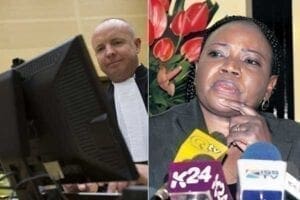
Fergal Gaynor, the victims’ lawyer in the Kenyatta case, argued that despite the court determining that the case should be withdrawn if the prosecutor does not have sufficient evidence to sustain it, the victims have the right to know the truth about the crimes committed against them, and the identities of those most responsible.
This is absolute balderdash. Gaynor suggests that the victims do not know what happened to them and the court should allow the prosecutor to tell them. There is also no way a competent lawyer can argue that the victims should be given the names of those who were responsible for what happened to them despite the fact that both the prosecutor and court, have admitted that there is insufficient evidence to sustain a trial to prove that the suggested names were the ones actually responsible.
In my opinion, having failed to convince a competent court of her claims against Uhuru, the prosecutor arranged with the victims’ lawyer for this request to be made and then connived with the court to ensure she gets carte blanche to prosecute the case she lost in open court, in the court of public opinion. In this court of public opinion she cannot lose because here she does not actually have to substantiate her claims, just make them and leave it to Uhuru to prove they are not true. She will also not be cross-examined by anyone so she can make whatever allegations she wants, in fact the more sensational, the better.
Uhuru’s defence said as much in court, but were overruled on the basis that because the evidence Bensouda had was insufficient to sustain trial, then the publication of such evidence would not be prejudicial to Uhuru’s reputation. Bensouda now has the permission of the court to hold press conferences across the world and ‘explain’ her allegations against Uhuru. Essentially she can ‘prosecute’ him publicly. She can then sit back and watch as the international and local media do what she was unable to do legally – crucify Uhuru.
Bensouda knows she cannot lose. Once the story picks up in the public domain (and we all know it will) Uhuru has only two options. He can choose to go to the press and defend himself, which will just build the story and give the prosecutor (and Gaynor) some more media time. Or, he can sue her, and she will defend herself on the basis she was ‘ordered’ to do what she is doing by the court. In addition, if he chooses to sue she gets another bite at the cherry she lost, which will be easier now because she will be ‘defending’ her case against Uhuru, who will now be forced to prove his innocence.
Either way she wins!
Ironically, one of the more prominent members of the Kenyan-ICC support group, Kenyans for Peace, Truth & Justice at the weekend admitted to what Uhuru’s defence team alluded in its objections to this order. Writing in the Sunday Nation, George Kegoro argues that the release of the evidence that Bensouda has to the public “gives the prosecutor a chance to tell her version of the story”. Kegoro is basically confirming that this is all about Bensouda seeking an opportunity to prosecute her failed case in the court of public opinion. KPTJ’s vendetta against Uhuru also gets a lifeline.
If only Kenyans could see beyond the fact that Uhuru is President, they would understand how unjust this situation is. Imagine a scenario where you have been accused of a heinous crime, defended yourself successfully against your accuser to the point the accuser accepts she cannot sustain the allegations against you in court, only to watch the accuser manipulate the court to be allowed to publicise the same allegations she could not sustain incourt, on the Internet. And you cannot sue her! If we can put ourselves in such a situation, we would hold demonstrations demanding that the state defends its citizen from such injustice.
Meanwhile, I note that America is opposing ICC’s action against Israel on the argument that it is ‘counter-productive to the cause of peace’. Can we as Kenyans use the same argument to oppose the case against Deputy President William Ruto?
Ngunjiri is a Director of Change Associates, a Political Communications Consultancy.
-The Star









